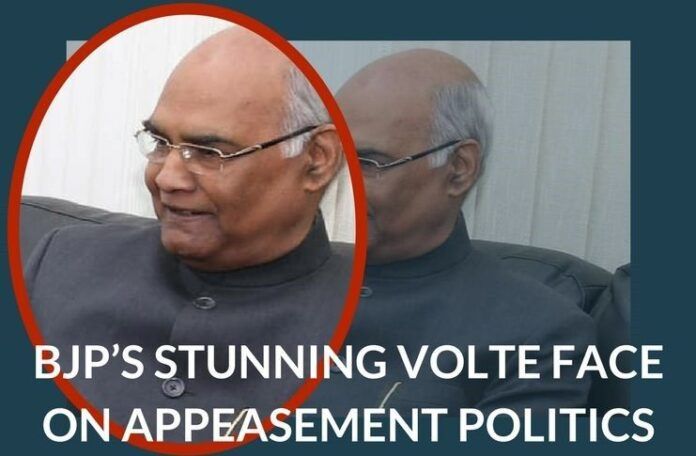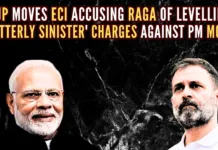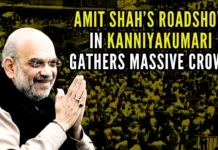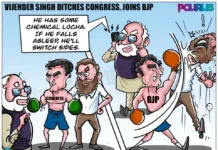
Mr Kovind’s foray into politics started as an aide to former Prime Minister Mr Morarji Desai and has represented the Central Government before the Delhi High Court and the Supreme Court in a legal career that has spawned over sixteen years.
[dropcap color=”#008040″ boxed=”yes” boxed_radius=”8px” class=”” id=””]A[/dropcap]s is their wont(customary behaviour), Bharatiya Janata Party (BJP) sprung a surprise on the nation with its Presidential candidate choice – Mr Ram Nath Kovind – the low profile and non-controversial Governor of Bihar.
Reportedly, Mr Kovind’s foray into politics started as an aide to former Prime Minister Mr Morarji Desai and has represented the Central Government before the Delhi High Court and the Supreme Court in a legal career that has spawned over sixteen years.
Entering full-time politics in 1991 by joining BJP, he served the party as Dalit Morcha President and Spokesperson. After a couple of failures in electoral contests, he was made Member of Parliament in Rajya Sabha from his home state of Uttar Pradesh. After his twelve year tenure in Parliament, little of his activities are known to citizens, before resurfacing in 2015 with his appointment as Governor of Bihar. This is a career synopsis of the man who soon will be elected as fourteenth President of India on 17th of
July 2017.
Even after his twelve year tenure in Parliament, little of his
activities are known to citizens
In caste ridden Indian politics, his selection is considered a master stroke in political circles. It dented the opposition unity with Bihar Chief Minister Mr Nitish Kumar endorsing the BJP choice. It also sent opposition parties into a tizzy who then found their own Dalit mascot for the Presidential contest. In choosing Mr Ram Nath Kovind as its nominee, what are the message of the BJP and its constituents in Parliament to the electorate of India and in particular to the Dalit community? Unfortunately, it is certainly not of new and developed India which Prime Minister Mr Modi espouses quite often to the youth of this country. On the other hand, it is one of appeasement politics that he professes to shun and does not mince words in condemning it.
[dropcap color=”#008040″ boxed=”yes” boxed_radius=”8px” class=”” id=””]B[/dropcap]elow the veneer of caste, it is difficult to find much in the biography of Mr Ram Nath Kovind. He represents the era of old age politics where caste held primacy. That he fought for the downtrodden, gave legal representation to marginalized, and has been the voice of poor can be found in many Supreme Court lawyers.
Being a two-time Member of Parliament in Rajya Sabha does not give his life history much cache. It is widely known that loyalty is rewarded in politics and this enabled him to become the Governor of Bihar. Neither the Dalit community nor the larger electorate can claim to be impressed with the credentials of this Presidential nominee.
If the BJP wanted a Dalit to reap political rewards, it should have looked outside the realm of politics. In a post-liberalized India, it is not difficult to find many rags to riches stories of Dalit individuals who have truly broken the “untouchability and victimhood” storyline that often presages the political narrative of the Dalit community. In Mr Rajesh Saraiya, the Dalits have their first billionaire businessman, whose biography is an outstanding narrative of successful Dalit entrepreneur and source of pride for the community.
If the BJP wanted a Dalit to reap political rewards, it should have looked outside the realm of politics.
Mr Milind Kamble, a highly qualified civil engineer, is the Head of the Dalit Chamber of Commerce who fought against all odds of “Dalit Victimhood” and became a successful businessman. Ms.Kalpana Saroj, Chairperson of Kamini Tubes, rose from the lowest strata of society to occupy the corner office of a company that has a turnover of more than Rs 1,000 crores.
[dropcap color=”#008040″ boxed=”yes” boxed_radius=”8px” class=”” id=””]B[/dropcap]iographies of many of today’s Dalit entrepreneurs are a story of grit, determination, overcoming odds, courage and success. Their record of fighting for immiserizing strata of society, offering education scholarships to the marginalised, encouraging the downtrodden to become entrepreneurs and offering employment to the poor are unparalleled. Choosing one of them to be President of India would have indeed sent a positive message to the Dalit community about their prospects in the Indian economy, boosted Dalit pride and would have made the Prime Minister an icon in the community.
Prime Minister Modi and BJP’s numero uno strategist Party President Mr Amit Shah realise that Dalit community support is the sine qua non to achieve governing majority in future electoral contests. As a step towards that goal, the strategy of choosing a BJP loyalist who also happens to be a Dalit is no different from that of the Congress party’s appeasement of minority community. In a post-liberalized India, political parties must realise communities are no voting monoliths.
In a post-liberalized India, political parties must realise communities are no voting monoliths.
The BJP bombarded the electorate in 2014 with the message “Appeasement towards none, Justice for all”. In choosing Mr Ram Nath Govind for President, the party has done a volte-face on its own slogan. The choice is indeed old style appeasement politics, not the new age politics that the Prime Minister often promises the youth of India and going by the experience of Mr K. R. Narayanan, the first Dalit leader to be President of India, unlikely to yield electoral dividends.
Note:
1. Text in Blue points to additional data on the topic.
2. The views expressed here are those of the author and do not necessarily represent or reflect the views of PGurus.
- Biggest Economic Accomplishment – Ending Crony Capitalism - December 13, 2019
- Mr. Rahul Gandhi must first become a Chief Minister - April 4, 2019
- How Congress lost Karnataka - May 15, 2018











Well…. for casteism to vanish people should be ready to give up their reservations at least after the first generation which has used up the benefit of reservation… it should be given to the next needy person rather than a doctor or engineer SC /ST using their reservations to bring out another son or daughter using reservations… it should be passed on to the next needy person in society and not allowed to pass generation after generation even after they have attained higher positions….
Again my personal opinion
This is not APPEASEMENT! Any child can see its a battle in the war against Congress and gang! The only way to destroy those who have betrayed cheated sold looted and divided India! No wonder the author is into writing! As they say, those who can’t, teach! And those who couldn’t, write!
Whether it is good choice or not will only depend on what he does in his tenure. Especially on abrogation of Article 370 as and when cabinet gathers courage to suggest same.
Well written Shri.KrishnaKumar. But Without Modiji you would be irrelevant and and your voice would be shut as HINDU TERROR. Politics is such that unfortunately appeasement is necessary. More importantly Uniting Hindus is the most important agenda we need today. Unite Hindus of all castes. This is a master stroke but this has to be converted into votes.
I don’t understand what this Dalit means? He is a human being like you and me. Why after so many years of independence, this Dalit still exists. Instead of uplifting Dalits and bringing them to mainstream, all political parties are taking advantage of these dalit profiles for political causes. Time to end this Dalit classification for political upmanship.
Why not also decimate poverty and hunger? Your insight is inspirational, who else would have thought of eliminating the caste system and removing the use of division in politics? Wonderful! Have you considered competing in a Miss World contest?
The role of a President is extremely limited, but could become crucial at times. The person should at least broadly understand the Constitution and not be one who subverts it during those crucial times. Otherwise, it is ornamental. I don’t see Mr. Kovind suffering on this count. The fact that he’s earned the goodwill of Nitish Kumar as Governor testifies to this. In fact, having been a good Governor adds to his qualification.
If the President wants, she/ he can use it to reach out to people and work for the larger social good, like Dr. Kalam did; wasn’t he seen more as a Tamil Muslim when he was selected? Whether Mr. Kovind will do something like Kalam, we have to wait and see. But Presidents are usually straightjacketed with a ceremonial role, and it is very rarely that Presidents break out and contribute beyond their call of duty.
We have a major disconnect between SC-STs and the rest of the society, and someone should do something about it. We should go beyond reservations and do something in the realm of affirmative action that brings them on par with the rest of the society, even without reservations. I hope Mr. Kovind does. From the little I have read about him, it appears to me that he could. But “will he?”; I don’t know.
Coming to the politics of it, whoever has the opportunity to have the President of his choice (Modi, in this case) will surely want to ensure that the President won’t stab him in his back. I see it as natural. So, I see nothing wrong in Modi nominating Kovind for Presidency. At least, Kovind is no Pratibha Patil (with undesirable background)! He appears to be a very good man.
I am SC and was a deluded leftist till few years ago. Thanks to Dr Swami’s speeches I have understood real history of India, real distinction between right wing and left wing politics and real root cause of misery of poor people of India. Rather than affirmative action, I think heavy investment on Judiciary and police and gradual abolition of deficit spending,socialist measures like RTE, food security, guaranteed work schemes like MNREGA etc and finally abolition of excessive taxation, can turn around Sc-ST situation in no time.
You mean create Utopia out of the distopia the CHALU CHA CHA his ACCURSED Dynasty, the leftists liberals , and the Muslim league FRANCHISEES created for the BRITS?